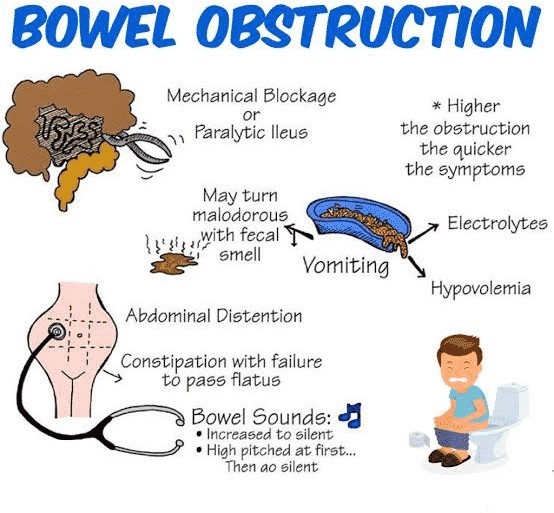A client is admitted with a small bowel (small intestine) obstruction. Which assessment findings are consistent with this diagnosis?
SELECT ALL THAT APPLY
Profuse vomiting.
Abdominal pain and distention.
Pain relieved by eating.
Blood in the stool.
Correct Answer : A,B,E
Small bowel obstruction can lead to the accumulation of gastric contents above the obstruction, causing vomiting.
Obstruction of the small bowel can result in crampy, colicky abdominal pain and abdominal distention.
Electrolyte imbalances, such as hypokalemia (low potassium), can occur due to vomiting and inadequate intake in cases of small bowel obstruction.
The following finding is not directly associated with small bowel obstruction:
Pain relief after eating is more commonly associated with peptic ulcer disease, not small bowel obstruction.
While blood in the stool can be seen in some cases of bowel obstruction, it is more commonly associated with lower gastrointestinal bleeding or other conditions affecting the colon, rather than small bowel obstruction.

Nursing Test Bank
Naxlex Comprehensive Predictor Exams
Related Questions
Correct Answer is B
Explanation
Dumping syndrome is a common complication after Gastric Bypass surgery, where food moves too quickly from the stomach to the small intestine. It occurs when the undigested contents of the stomach are "dumped" rapidly into the small intestine, leading to symptoms such as nausea, vomiting, abdominal cramps, diarrhea, lightheadedness, and sweating.
To manage dumping syndrome, it is important for the client to avoid foods and beverages that are high in sugar and carbohydrates. Consuming these types of foods can trigger rapid gastric emptying and exacerbate the symptoms. Instead, the client should focus on a well-balanced diet that includes lean proteins, healthy fats, and complex carbohydrates.

Correct Answer is D
Explanation
Gabapentin (Neurontin) is often used to treat neuropathic pain, including pain associated with peripheral neuropathy. It may also be used to manage other types of chronic pain, such as pain associated with fibromyalgia. While gabapentin is primarily an anticonvulsant medication, it is also used off-label for various other conditions, such as mood disorders and anxiety.
Whether you are a student looking to ace your exams or a practicing nurse seeking to enhance your expertise , our nursing education contents will empower you with the confidence and competence to make a difference in the lives of patients and become a respected leader in the healthcare field.
Visit Naxlex, invest in your future and unlock endless possibilities with our unparalleled nursing education contents today
Report Wrong Answer on the Current Question
Do you disagree with the answer? If yes, what is your expected answer? Explain.
Kindly be descriptive with the issue you are facing.
